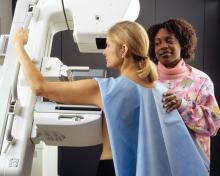A new analysis of the data behind controversial new recommendations raising the age for women to start routine mammography screening supports older recommendations endorsed by the American Cancer Society.
In November 2009, the U.S. Preventive Services Task Force (USPSTF) released recommendations for breast cancer for women to begin routine screening biennially, beginning at age 50 and ending at age 74 years. Prior to that time, the USPSTF – and other organizations – recommended screening mammography every 1-2 years for women beginning at age 40. The ACS recommends annual screening mammography starting at age 40.
Based on an average of six CISNET (Cancer Intervention and Surveillance Modeling Network) models of benefit, the authors of the new analysis concluded that the data show that annual screening of women aged 40-84 years would reduce mortality by 39%, producing the greatest benefit when compared with the new recommendation.
"A 71% improvement in mortality reduction and similar improvement in life-years gained is predicted for women who elect ACS guidelines over the USPSTF guidelines of biennial mammography between ages 50 and 74 years," R. Edward Hendrick, Ph.D., and Dr. Mark A. Helvie wrote in the February 2011 issue of the American Journal of Roentgenology.
The authors attribute this improvement in mortality reduction to cumulative smaller gains in three areas: screening women aged 40-49 years, annual vs. biennial screening in women aged 50-74 years, and screening beyond age 74 years.
The authors used an ending age of 84 years in the ACS screening regimen because that coincides with CISNET data (AJR 2011 February [doi:10.2214/AJR.10.5609]).
The release of the new USPSTF recommendations in 2009 caused confusion among both physicians and patients. The USPSTF analysis led some physicians and patients to conclude that "mammography is ineffective for women in their 40s and that there is no real difference between annual and biennial screening intervals for older women," the researchers noted.
In developing the new recommendations, the task force also highlighted the harms associated with screening mammography, such as false positives and unnecessary biopsies.
Dr. Helvie and Dr. Hendrick found that a woman aged 40-49 years who has an annual screening mammogram will have a false-positive screening mammogram once every 10 years on average. She may be called back for additional imaging once every 12 years, undergo a false-positive biopsy once every 149 years, and have a missed breast cancer once in 1,000 years.
"These analyses also show that the individual harms from the additional screening, including the risks of recall for additional testing, biopsy, and radiation-induced breast cancers, are minimal compared with the life-saving benefit of early detection for women electing screening."
Dr. Hendrick is a radiologist at the University of Colorado in Denver, and Dr. Helvie is the director of breast imaging at the University of Michigan Health System in Ann Arbor.
Dr. Hendrick disclosed that he is a consultant to GE Healthcare and serves on the medical advisory boards of Koning Corp. and Bracco Imaging. Dr. Helvie has received grant support from GE Healthcare. All three companies produce mammography equipment or software.


